

How to Become Indistractable [Nir Eyal] 9 Ever-Present Distractions That Keep Us From Fully Living. Why can’t we read anymore? Spending time with friends, or family, I often feel a soul-deep throb coming from that perfectly engineered wafer of stainless steel and glass and rare earth metals in my pocket.

Touch me. Look at me. You might find something marvellous. This sickness is not limited to when I am trying to read, or once-in-a-lifetime events with my daughter. At work, my concentration is constantly broken: finishing writing an article (this one, actually), answering that client’s request, reviewing and commenting on the new designs, cleaning up the copy on the About page. All these tasks critical to my livelihood, get bumped more often than I should admit by a quick look at Twitter (for work), or Facebook (also for work), or an article about Mandelbrot sets (which, just this minute, I read). Dopamine and digital It turns out that digital devices and software are finely tuned to train us to pay attention to them, no matter what else we should be doing.
How can books compete? Mental Toughness and the "Marathon Monks" In the northeastern hills outside Kyoto, Japan there is a mountain known as Mount Hiei.
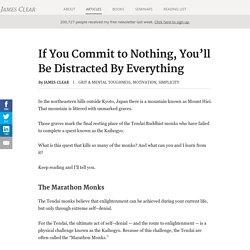
That mountain is littered with unmarked graves. Those graves mark the final resting place of the Tendai Buddhist monks who have failed to complete a quest known as the Kaihogyo. What is this quest that kills so many of the monks? And what can you and I learn from it? Keep reading and I’ll tell you. The Marathon Monks The Tendai monks believe that enlightenment can be achieved during your current life, but only through extreme self–denial. Young Delacroix on the Importance of Solitude in Creative Work and How to Resist Social Distractions. By Maria Popova “Nourish yourself with grand and austere ideas of beauty that feed the soul… Seek solitude.”
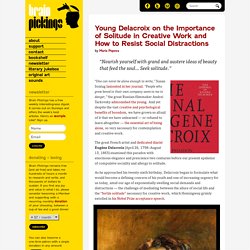
“One can never be alone enough to write,” Susan Sontag lamented in her journal. “People who grow bored in their own company seem to me in danger,” the great Russian filmmaker Andrei Tarkovsky admonished the young. And yet despite the vast creative and psychological benefits of boredom, we have grown so afraid of it that we have unlearned — or refused to learn altogether — the essential art of being alone, so very necessary for contemplation and creative work. The great French artist and dedicated diarist Eugène Delacroix (April 26, 1798–August 13, 1863) examined this paradox with enormous elegance and prescience two centuries before our present epidemic of compulsive sociality and allergy to solitude. Loss of Control. Social Influence. Digital Manipulation. Digital Addiction. An Addict’s Guide to Overcoming the Distraction Habit. By Leo Babauta Yesterday wasn’t a very focused day for me — I got work done, but I also researched a bunch of newish personal interests (mostly programming and cycling), played an iPhone trivia game with my kids, read a bunch of online articles, and did very little of the writing I’d planned.
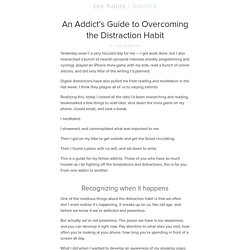
Digital distractions have also pulled me from reading and meditation in the last week. I think they plague all of us to varying extents. Realizing this, today I closed all the tabs I’d been researching and reading, bookmarked a few things to read later, shut down the trivia game on my phone, closed email, and took a break. I meditated. I showered, and contemplated what was important to me. Then I got on my bike to get outside and get the blood circulating. Then I found a place with no wifi, and sat down to write. This is a guide for my fellow addicts. Recognizing when it happens One of the insidious things about the distraction habit is that we often don’t even realize it’s happening. The Cure for Your Distraction Syndrome. By Leo Babauta I absolutely adore the Internet, but there’s no doubt it has made us more distracted than ever.
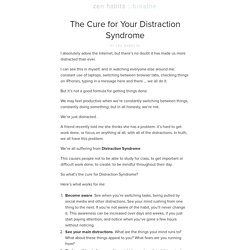
I can see this in myself, and in watching everyone else around me: constant use of laptops, switching between browser tabs, checking things on iPhones, typing in a message here and there … we all do it. But it’s not a good formula for getting things done. We may feel productive when we’re constantly switching between things, constantly doing something, but in all honesty, we’re not. We’re just distracted. A friend recently told me she thinks she has a problem: it’s hard to get work done, or focus on anything at all, with all of the distractions. 10 Ways to Do What You Don’t Want to Do. By Leo Babauta Life would be grand if we only did what our fleeting hearts wanted to do, each moment of the day.
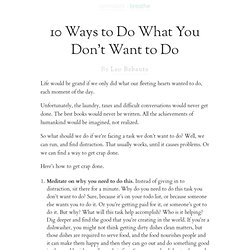
Unfortunately, the laundry, taxes and difficult conversations would never get done. The best books would never be written. All the achievements of humankind would be imagined, not realized. So what should we do if we’re facing a task we don’t want to do? Here’s how to get crap done. Meditate on why you need to do this.